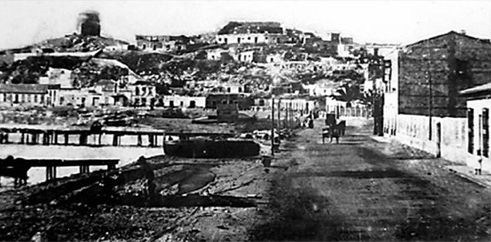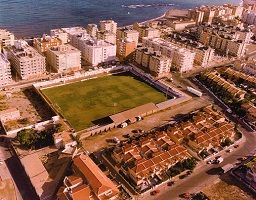John (Juan) Gray

If Scots-Andalusia gave Spain both its first and oldest, existing clubs in the forms of Minas de Rio Tinto and Recreativo de Huelva and in Sevilla its first official game then Scots-Murcia gives it its oldest ground. It is to be found in the town of Aguilas, on the country's Mediterranean coast between Cartagena and Almeria and its notional owner is the long-dead but much recalled Juan (John) Gray.
John Watson Gray was born in Kelso in 1860, the son of a clothier, and brought up after his father's early death mainly in Edinburgh, where he is recorded as a clerk and specifically bank-clerk. But for reasons as yet unknown about 1890 he left our capital behind and arrived in Murcia. It was as the region, already a major source of esparto, much of which was exported to Britain for paper-making, was seeing British-financed expansion of its mining with railways to match. Aguilas, long a port for the export of the grass was becoming the same for a variety of ores.
In such an expansive phase of economic change and growth Watson Gray clearly prospered and became well-integrated into his new home-town. By 1892 he was already recognised as an "habitual resident". He took the name Juan. But he did not forget his native roots entirely. He organised ad hoc fitba' games with locals. He returned to Scotland and family at least once, notably In 1899 to Colinton by Edinburgh to marry Mary Euphemia Smith, ten years his younger. She is recorded simply as a spinster, one of the witnesses his sister and he a Banker, with his address given as Aguilas, Spain. And it was to that town they soon returned, he to found and run with other ex-patriot businessmen, a number also Scots, essentially a bank amongst other enterprises.

But in the meantime as Britons arrived in Spain so Spanish travelled to the United Kingdom. One, Gines Garcia Abelan, had been sent to Aberdeen to learn English, God save him, and returned in 1896 with the football bug. He introduced the game to friends and by the turn of the century there was enough impetus to form Sporting Club Aguileno. It, with Gray not only President, financier and trainer, promptly went on a seven-year, twenty-six match winning-streak. However, he also known to have taught his employees the game, notably those at his esparto-processing works, spreading the Scots working-class contagion not just to the local middle-class but to the Aguilan working-man. It meant that when Sporting Club Aguileno foundered in 1907 he was instrumental in it being replaced by

Aguilas Sporting Club, he once more as trainer and, with another Scot, Norman Maclean and a Mancunian, with a Scots name, George Boag, one of the three large shareholders.
John Gray would remain in Aguilas for the best part of two more decades but, aged about sixty-five, he is said to have left the "without trace". In fact he returned to Britain and the childless couple seem to have settled in England. Certainly in 1948 the death of Mary Gray is recorded in Droxford in Hampshire and that of Juan also there in 1953, at the venerable age of ninety-two.
However, long before John Gray left his Spanish home of over thirty years he bestowed one more gift. The land, on which Aguilas Sporting Club played its home games, now El Rubial, was owned by him and in 1915 he signed it over to the town on condition that, as long as sport was played in the community, it could not be sold. Calle Juan Gray forms one side of the stadium.
Birth Locator:
Residence Locator(s):
Grave Locator:
N/A
Ground Locator:
and
Other Sources:
Back to the Spanish Trail
or the SFHG Home page